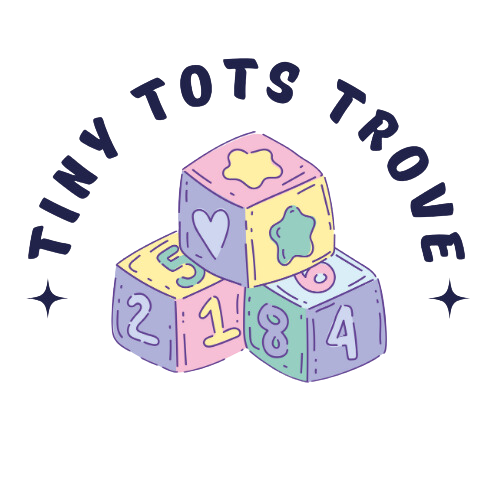
Welcome to Tiny Tots Trove! Today, we’re diving into the importance of tummy time for your little one's development. Tummy time is a crucial activity that helps strengthen your baby’s muscles and promotes overall growth. In this comprehensive guide, we’ll explore the benefits and challenges of tummy time and provide tips to make this activity enjoyable for both you and your baby.
What is Tummy Time?
Tummy time involves placing your little one on their stomach while they are awake and supervised. This simple activity plays a vital role in your baby's physical and cognitive development, helping them build the necessary muscles for milestones such as crawling, sitting, and walking.
Benefits of Tummy Time
1. Strengthens Neck and Shoulder Muscles
Tummy time is essential for developing your baby's neck and shoulder muscles. As your baby lifts their head and pushes up with their arms, they are building strength and coordination, which are crucial for future motor skills. This is especially important for infants starting at 3 to 4 months and continues to benefit them up to 18 months and beyond.
2. Prevents Flat Head Syndrome
Regular tummy time helps prevent positional plagiocephaly, also known as flat head syndrome. When babies spend too much time lying on their backs, the constant pressure on the same spots can flatten parts of their skull. Tummy time provides a necessary break from this pressure, promoting a more rounded head shape.
3. Enhances Motor Skills
Engaging in tummy time encourages your little one to move and explore their environment, which is vital for developing motor skills. The movements during tummy time help babies learn to roll over, crawl, and eventually walk. This activity supports motor development stages from 6 months to 12 to 18 months.
4. Boosts Sensory Development
Tummy time provides a different perspective of the world, stimulating your baby’s senses. The textures they feel, the toys they reach for, and the sounds they hear all contribute to sensory development. Kits play an essential role in providing varied sensory experiences for infants.
5. Promotes Cognitive Development
As your baby reaches for toys and interacts with their surroundings during tummy time, they are also engaging their brain. This activity encourages problem-solving and cognitive development as babies learn to navigate their environment. It is beneficial for cognitive growth from as early as 4 months awake time to 21 months.
Challenges of Tummy Time
While tummy time offers numerous benefits, it can also present challenges, particularly for new parents and their little ones. Here are some common challenges and tips to overcome them:
1. Baby's Discomfort
Some babies may initially resist tummy time because it requires effort and can be uncomfortable. To ease your baby into it, start with short sessions of 1-2 minutes and gradually increase the duration as they become more comfortable.
Tip: Place a rolled-up towel under your baby’s chest to provide extra support and make the position more comfortable. This is particularly useful for infants around 3 to 5 months.
2. Fussiness and Crying
It's normal for babies to fuss or cry during tummy time, especially if they are not used to it. It's important to stay calm and encouraging, offering reassurance and comfort.
Tip: Use toys and mirrors to distract and engage your baby. Singing or talking to them can also help make tummy time more enjoyable.
3. Lack of Interest
If your little one seems uninterested in tummy time, try to make it more engaging by introducing colorful and interesting toys. Changing the location and providing new things to look at can also stimulate their interest.
Tip: Get down on the floor with your baby and interact with them face-to-face to make tummy time a more social and enjoyable experience.
4. Consistency
Consistency is key to making tummy time a beneficial part of your baby’s routine. It can be challenging to remember to incorporate tummy time into a busy schedule.
Tip: Incorporate tummy time into daily routines, such as after diaper changes or naps, to make it a regular part of your baby’s day.
Tips for Successful Tummy Time
-
Start Early: Begin tummy time soon after birth, with short sessions gradually increasing in length.
-
Make it Fun: Use toys, mirrors, and interaction to keep your baby engaged.
-
Comfort and Support: Ensure your baby is comfortable and provide support as needed.
-
Consistency: Incorporate tummy time into your daily routine to establish a habit.
-
Stay Positive: Encourage and praise your baby during tummy time to make it a positive experience.
Tummy time is a vital activity for your little one's development, offering numerous benefits that support physical, sensory, and cognitive growth. While it can present challenges, with patience and consistency, you can make tummy time an enjoyable and rewarding part of your baby’s daily routine.
At Tiny Tots Trove, we are committed to providing you with the knowledge and tools to support your child's development. Explore our range of educational toys and resources to enhance your tummy time experience. Happy parenting!
Citations
-
Taub, M., & Schecter, B. (2007). Tummy Time: Simple Practices for Little People. American Physical Therapy Association.
-
Laughlin, J., Luerssen, T. G., & Dias, M. S. (2011). Prevention and management of positional skull deformities in infants. Pediatrics.
-
American Academy of Pediatrics. (2019). Caring for Your Baby and Young Child: Birth to Age 5. American Academy of Pediatrics.
-
Williams, K., & Caskey, R. (2009). Early intervention and sensory integration approaches to pediatric therapy. Pediatric Therapy.
-
Lobo, M. A., & Galloway, J. C. (2012). Enhanced handling and positioning in early infancy advances development throughout the first year. Child Development.



